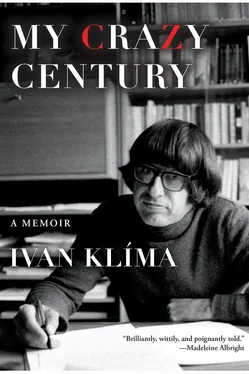He called me a week later. He was pleased with both my story and my articles. When would it be convenient for me to start work?
And so I became an editor at Květy .
*
The editorial offices were housed in a newly constructed building called Rudého práva on Na Poříčí Street. Everything here was clean and tidy, and there was a bathroom with shower stalls at the end of the hallway. The secretary affixed my name on the door of my office — all this was a sign that I had finally become an adult and could earn a living.
I soon discovered that the tram took a roundabout way to my office, and I decided it would be quicker to run to work. I would cut across Vinohrady and run down along Žižkov Hill past the train station Praha-střed, and then I’d be at work. My daily jog took about fifteen minutes, and I always got to the editorial offices drenched in sweat. Since it wasn’t appropriate for an editor to work in shorts and a sweaty T-shirt, I filled one of my desk drawers with extra shirts and a pair of trousers. I would run to the office, take a shower, change into fresh clothes, and set to work.
My behavior, however, did not meet with understanding among the bosses of the editorial office. About three weeks later, the deputy editor in chief called me in for a discussion. He had nothing against me personally, but I had to realize that everywhere I went I was representing the magazine, that is, the publisher as well. It was not appropriate for thousands of people to see me hurtling along the streets of Prague every day carrying a briefcase. What if somebody recognized me? Then he would go around saying we employed a nutcase who didn’t even earn enough for a tram ticket. If I traveled like a normal person, that is, not running, it didn’t matter if I came by foot or by tram.
This was my first act of wrongdoing during the few months I was employed at Květy.
The editor in chief at the time, at least in name, was a bad writer whose only merit, besides membership in the party, was that he’d composed a novel in which he assiduously and mercilessly denigrated exploitation in Tomáš Bat’a’s factories. However, he never strayed into the offices; even his paycheck had to be sent to him by mail. In reality his deputy headed the magazine. He was a diminutive man of indeterminate age but somewhere under fifty, and was perpetually afraid an article that could be considered inaccurate or even provocative would leak into the magazine. Another class-conscious bigwig worked here, the venerable widow of the Communist writer Egon Ervín Kisch. This comrade likewise did little actual work; instead she watched over everything that went on in the editorial offices and apparently did not take kindly to the fact that youngish and insufficiently class-conscious people were employed there who, in her opinion, threatened the quality, but most of all the party mission, of the magazine. By her side stood the chairwoman of the party organization (she sometimes wrote as well on women’s issues, that is, mostly fashion), who was always prepared to call a party meeting and raise the issue of how something unseemly could happen. Among other worthy comrades was the foreign desk editor, who limited his reporting to articles on other friendly Socialist countries and telephone calls with opponents of Western imperialists and devotees of revolution throughout the rest of the world. I found myself for the first, and actually last, time in an environment ruled by prominent Communists, who were always resolved to advocate whatever the party leadership required. I was stunned by how the environment bubbled over with rancor, continual suspicion, malicious gossip, and personnel screening.
Once my colleague Kabíček and I set off on an assignment to southern Bohemia and instead of a photographer we took along a graphic artist, a woman who was approximately our age. We thought it would be interesting to have her drawings instead of photographs enliven our text.
This deed scandalized the reputable widow. At a meeting, she accused us of using editorial funds to organize a sex excursion, which had tarnished the magazine’s reputation. The artist burst into tears, and we tried in vain to convince everyone that we hadn’t touched her. We got off with a warning and instructions that similar excursions would not be approved in the future. From now on, only our photographers could accompany us on assignments.
All these petty affairs, however, faded in significance before the momentous events taking place on the international stage. The first thing we heard was the distant thunder of a workers’ strike in Poland, and then the Hungarians began to defy the Communist regime. At the same time the so-called Suez crisis broke out. Not a word was to be found about these events in our journal; in our editorial offices, however, the only thing people talked about was the situation in Hungary. The chairwoman of the party organization would call a meeting once a week to discuss the political situation. Worthy Communists cautiously (this was, after all, only a criticism of Soviet Communists) gave us to understand that the enormity of Stalin’s crimes had been exaggerated and could provoke all enemies of socialism. We were to avoid anything that could arouse sympathy for elements that might assume their moment had arrived. Apparently, these elements were prepared to attack the very foundations of Socialist society and the leading role of the party under the pretense of criticizing the cult of personality. At the end of October, the Czechoslovak and Soviet press agencies began reporting appalling news about Communist functionaries being hanged in Hungary, about insurgents murdering their own families, and about how those who had managed to escape from mutinous Budapest were seeking asylum here or even in capitalist Austria.
Father started listening to independent Hungarian radio broadcasts, and when I came home he would change the station to Vienna, so I could listen to the latest news as well. If you didn’t know they were speaking about the same events, you would have assumed there were two different Hungarian republics. One broadcast would talk about counterrevolution, the other about a national uprising; one reported that insurgents had resolved to institute a reign of terror aimed at the people and were determined to do away with socialism, and the other reported that the great majority of Hungarians were enthusiastically greeting the renewal of democracy and freedom. But how could socialism be done away with? Did any kind of socialism ever exist anywhere? Hadn’t terror been used here on everyone who refused to submit?
Now armed militiamen stood in front of and inside our office building just to make it clear that no such insurrection would take place here. Our chairwoman read to us a proposed resolution in which she proclaimed, in the name of the entire editorial team, support for the powers of socialism to halt the orgy of Hungarian counterrevolution.
I did not like this resolution and fled the meeting before it was voted on.
The next day the chairwoman drily informed me that she had signed the resolution on my behalf, since I had obviously been in such a hurry that I couldn’t wait a few more minutes. She knew I would have signed it and assumed that I held the same opinion as she did concerning the events in Hungary. The end of her sentence sounded rather like a menacing question.
The next day — it was already the beginning of November — our deputy editor in chief left for a general factory meeting, and when he returned he told us that socialism in Hungary was under threat; insurgents had started taking control of more territory. They were murdering party members and were planning to occupy parts of Slovakia that were predominantly Hungarian. The situation was so grave that he had decided to do something about it and thus had enlisted the entire editorial staff into the People’s Militia.
Читать дальше












